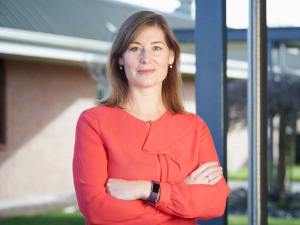Australian teams to help repair North Canterbury irrigators after storm
Moves are afoot to get a team of Australians over here to help repair North Canterbury's irrigation machinery, ravaged by the big windstorm of late October.
 Irrigation NZ chief executive Vanessa Winning says there is a need for a holistic and long-term strategic view of water.
Irrigation NZ chief executive Vanessa Winning says there is a need for a holistic and long-term strategic view of water.
A recent report on water management acknowledges that the status quo of water management is unlikely to be sustainable.
The Infrastructure Commission report has the backing of Irrigation NZ.
“We are pleased the report highlights the need for a holistic and long-term strategic view of water to ensure optimal, sustainable and inclusive outcomes,” says Irrigation NZ chief executive Vanessa Winning.
“This is long overdue and something we have advocated for.”
The report is one of a series looking at the current state of key infrastructure sectors. These are based on a review of existing literature as well as interviews with experts in the sector.
It is part of commission’s work toward a 30-year strategy for infrastructure and feedback is being sought on the document.
Winning says the report signals that there is appetite for change in water management that can provide a range of social, environmental and economic benefits.
However, she adds that this cannot be done piecemeal at a regional level – the strategy must be driven from the top.
“We see positive change with the Three Waters Review and the focus on freshwater quality, and signals that we are moving toward resolution on Māori rights and interests in water.
“This is all good stuff, but, as part of this, we do also need the value of water for productive use to be part of the solution in strategic water management, rather than being identified as a problem. Irrigation - properly installed and used - is a tool for supporting communities, aiding catchment health, enabling land-uses for high value primary production, and providing access to underdeveloped land for those previously locked out.
“Well planned and executed water storage schemes can provide a range of benefits which will help us work toward a more sustainable, inclusive and productive economy.
“We agree water is an essential resource which deserves long-term planning and expertise to ensure its benefits. We look forward to seeing how Te Waihanga’s report leads to action,” says Winning.
The latest Global Dairy Trade auction results have delivered a boost to dairy farmers.
New Zealand potato growers are prioritising value creation from high yields to meet a complex mix of challenges and opportunities, says Potatoes NZ chief executive Kate Trufitt.
A Hawke's Bay apple orchardist supports the Government's objective of doubling exports but says this won't happen in the horticulture sector unless there's a change in the process for bringing new plant material into the country.
Canterbury arable farmers are down by tens of millions of dollars after a rollercoaster of wild changeable January weather saw harvests delayed and some crops destroyed by violent hailstorms.
Could a breakthrough in fermentation create a new multi-million-dollar export market for shiitake mushroom extracts into China?
Meadow Fresh has created the world's first fantasy sports league powered by real cows.